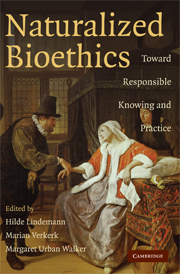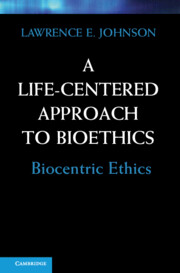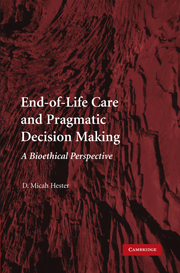Naturalized Bioethics
Naturalized Bioethics represents a revolutionary change in how health care ethics is practiced. It calls for bioethicists to give up their dependence on utilitarianism and other ideal moral theories and instead to move toward a self-reflexive, socially inquisitive, politically critical, and inclusive ethics. Wary of idealizations that bypass social realities, the naturalism in ethics that is developed in this volume is empirically nourished and acutely aware that ethical theory is the practice of particular people in particular times, places, cultures, and professional environments. The essays in this collection examine the variety of embodied experiences of individual people. They situate the bioethicist within the clinical or research context, take seriously the web of relationships in which all human beings are nested, and explore a number of the many different kinds of power relations that inform health care encounters. Naturalized Bioethics aims to help bioethicists, doctors, nurses, allied health professionals, disability studies scholars, medical researchers, and other health professionals address the ethical issues surrounding health care.
- Revolutionises bioethics theory
- Features prominent scholars from a range of disciplines
- Internationally focussed, giving views and ideas from across the globe
Reviews & endorsements
“…Naturalized Bioethics is an excellent anthology, well-worth reading. Many of the issues it raises are in fact new and it deepens our understanding of concepts such as autonomy and responsibility. Also welcome is the book’s persistent focus on power issues. In this connection, I found the concluding chapter particularly good. In it, Verkerk and Lindemann plead with bioethicists to rethink their own professional identity. Bioethicists are not ethics experts in the sense of being more morally right or morally good than other people…Bioethicists are the enablers of moral conversation. It may begin with them, but it should not end with them -- at least not in the real/natural world in which we actually live.”
Rosemarie Tong, University of North Carolina at Charlotte, Notre Dame Philosophical Reviews
Product details
October 2008Paperback
9780521719407
292 pages
230 × 151 × 14 mm
0.4kg
Available
Table of Contents
- Part I. Responsible Knowing:
- 1. Moral bodies: epistemologies of embodiment Jackie Leach Scully
- 2. Choosing surgical birth: desire and the nature of bioethical advice Raymond DeVries, Lisa Kane Low, and Elizabeth Bogdan-Lovis
- 3. Holding on to Edmund: the relational work of identity Hilde Lindemann
- 4. Caring, minimal autonomy, and the limits of liberalism Agnieszka Jaworska
- 5. Narrative, complexity, and context: autonomy as an epistemic value Naomi Scheman
- 6. Toward a naturalized narrative bioethics Tod Chambers
- Part II. Responsible Practice:
- 7. Motivating health: empathy and the normative activity of coping Jodi Halpern and Margaret Olivia Little
- 8. Economies of hope in a period of transition: parents in the time leading up to their child's liver transplantation Marre Knibbe and Marian Verkerk
- 9. Consent as a grant of autonomy: a care ethics reader of informed consent Joan Tronto
- 10. Professional loving care and the bearable heaviness of being Annelies van Heijst
- 11. Ideal theory bioethics and the exclusion of people with severe cognitive disabilities Eva Feder Kittay
- 12. Epilogue: naturalized bioethics in practice Marian Verkerk and Hilde Lindemann.





